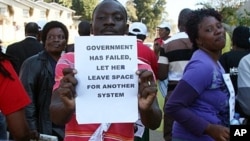The general secretary of Swaziland’s workers union says a planned week-long nationwide strike will begin Monday, despite government opposition.
The strike, organizers say, aims to press demands for better working conditions and increased pay.
Vincent Dlamini said Swazi public workers are frustrated with their current living conditions.
“Workers are very displeased about the situation in Swaziland. We’ve got an economy that has collapsed as a result of political mismanagement and high levels of corruption,” said Dlamini. “Workers have resolved today to embark on a protest action, which means they will basically be on strike nationwide and from various sectors of the economy.”
Pro-democracy supporters have also adopted the strike calling it the “global action week on Swaziland.”
Dlamini said unions in several African countries will protest in their respective countries in solidarity with their colleagues in Swaziland.
“There will be demonstrations at Swaziland embassies in their various countries. In countries [with no Swazi] embassies, there will be workers demonstrating [at] the embassies of the United States and the United Kingdom,” said Dlamini. “Petitions will be sent to them to intervene and assist Swaziland to democratize because the fundamental problem of Swaziland is democracy.”
Observers say the government could punish workers who participate in the strike by refusing to pay them for the days they stayed off work. But, Dlamini said the workers will not be deterred by the government “intimidation tactics.”
Groups supporting the government have dismissed the one-week strike as unpatriotic and illegal. They contend that the strikers want to make a political statement, instead of coming together to solve the country’s problems. But Dlamini rejects the accusations as “misplaced.”
“We the workers understand that we cannot confine ourselves to just bread and butter issues when we know bread and butter problems are a result of the political problems in our country,” said Dlamini. “We have given the government our demands from labor, and the demands are very clear.”
He also said organizers are aware the government has sought a court injunction to thwart the strike action. But Dlamini said the workers will ensure their voices are heard and their demands met.
“If that injunction is given by the court, we will oppose it and try to defend our position,” he added.
Analysts say although a constitution was reintroduced in Swaziland, the level of power invested in King Mswati III is so significant that the country can be considered an absolute monarchy.
Critics say the government has successfully stifled political opposition by putting pressure on human rights organizations, trade unions, and civil society groups and banned all political parties.









